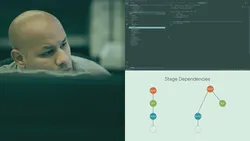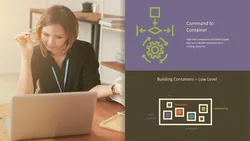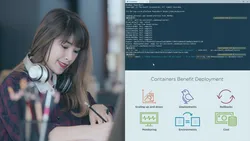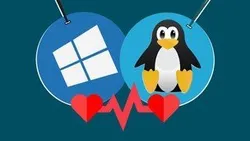
Developing Docker Apps: Core Principles 
This course provides an introduction to developing containerized applications with Docker, covering the core principles and best practices. Learn how to use Docker to create and deploy applications quickly and efficiently. ▼
ADVERTISEMENT
Course Feature
![]() Cost:
Cost:
Free Trial
![]() Provider:
Provider:
Pluralsight
![]() Certificate:
Certificate:
Paid Certification
![]() Language:
Language:
English
![]() Start Date:
Start Date:
On-Demand
Course Overview
❗The content presented here is sourced directly from Pluralsight platform. For comprehensive course details, including enrollment information, simply click on the 'Go to class' link on our website.
Updated in [March 06th, 2023]
This course, Developing Docker Apps: Core Principles, provides an overview of the core principles for developing containerized applications with Docker. It covers topics such as developing inside containers, making containers lean and secure, and debugging applications running in a container. By the end of the course, learners will have the skills and knowledge to confidently develop software applications using a container-oriented workflow.
[Applications]
It is suggested that those who have completed this course apply their knowledge by developing containerized applications with Docker, following the best practices outlined in the course. Additionally, they should use the techniques learned to create a productive environment for developing containerized applications, as well as debug applications running in a container.
[Career Paths]
Recommended Career Paths:
1. DevOps Engineer: DevOps engineers are responsible for managing the development, testing, and deployment of applications using container-oriented workflows. They must be knowledgeable in the principles of developing with Docker, such as developing inside containers, making containers lean and secure, and debugging applications running in containers. As the demand for containerized applications continues to grow, DevOps engineers will be in high demand.
2. Cloud Architect: Cloud architects are responsible for designing and implementing cloud-based solutions. They must be knowledgeable in the principles of developing with Docker, such as developing inside containers, making containers lean and secure, and debugging applications running in containers. As cloud computing continues to grow, cloud architects will be in high demand.
3. Container Security Engineer: Container security engineers are responsible for ensuring the security of containerized applications. They must be knowledgeable in the principles of developing with Docker, such as developing inside containers, making containers lean and secure, and debugging applications running in containers. As the demand for secure containerized applications continues to grow, container security engineers will be in high demand.
4. Software Developer: Software developers are responsible for developing software applications. They must be knowledgeable in the principles of developing with Docker, such as developing inside containers, making containers lean and secure, and debugging applications running in containers. As the demand for containerized applications continues to grow, software developers will be in high demand.
[Education Paths]
1. Bachelor of Science in Computer Science: This degree path focuses on the fundamentals of computer science, such as programming, software engineering, and computer architecture. It also covers topics such as artificial intelligence, machine learning, and data science. With the rise of containerized applications, this degree path is becoming increasingly important for developers who want to stay ahead of the curve.
2. Bachelor of Science in Software Engineering: This degree path focuses on the design and development of software applications. It covers topics such as software design, software development, and software testing. With the rise of containerized applications, this degree path is becoming increasingly important for developers who want to stay ahead of the curve.
3. Master of Science in Cloud Computing: This degree path focuses on the fundamentals of cloud computing, such as cloud architecture, cloud security, and cloud storage. It also covers topics such as containerization, orchestration, and DevOps. With the rise of containerized applications, this degree path is becoming increasingly important for developers who want to stay ahead of the curve.
4. Master of Science in Artificial Intelligence: This degree path focuses on the fundamentals of artificial intelligence, such as machine learning, natural language processing, and computer vision. It also covers topics such as robotics, autonomous systems, and deep learning. With the rise of containerized applications, this degree path is becoming increasingly important for developers who want to stay ahead of the curve.
Course Provider

Provider Pluralsight's Stats at AZClass
Pluralsight ranked 16th on the Best Medium Workplaces List.
Pluralsight ranked 20th on the Forbes Cloud 100 list of the top 100 private cloud companies in the world.
Pluralsight Ranked on the Best Workplaces for Women List for the second consecutive year.
AZ Class hope that this free trial Pluralsight course can help your Docker skills no matter in career or in further education. Even if you are only slightly interested, you can take Developing Docker Apps: Core Principles course with confidence!
Discussion and Reviews
0.0 (Based on 0 reviews)
Explore Similar Online Courses

OLD VERSION DO NOT USE Coding Interview Prep

Poetry in America: The Civil War and Its Aftermath

Python for Informatics: Exploring Information

Social Network Analysis

Introduction to Systematic Review and Meta-Analysis

The Analytics Edge

DCO042 - Python For Informatics

Causal Diagrams: Draw Your Assumptions Before Your Conclusions

Whole genome sequencing of bacterial genomes - tools and applications

Managing Docker on Linux Servers

Fundamentals of Docker and Kubernetes for NET Developers


Start your review of Developing Docker Apps: Core Principles